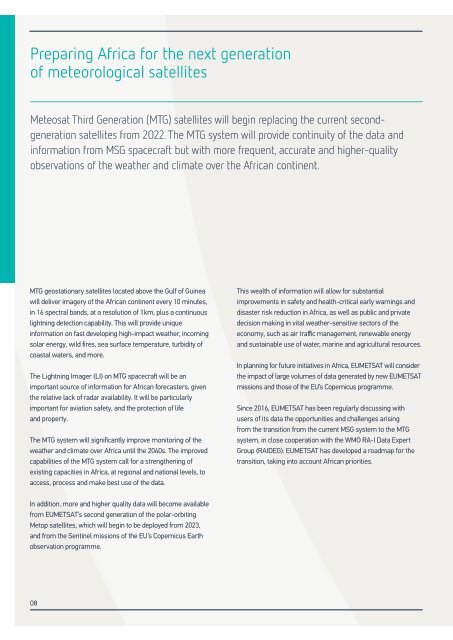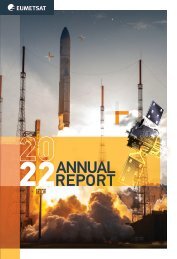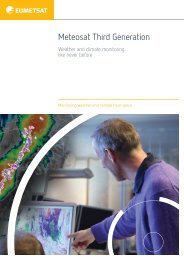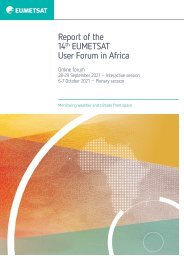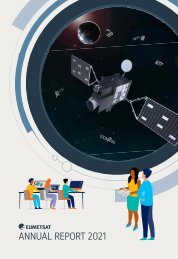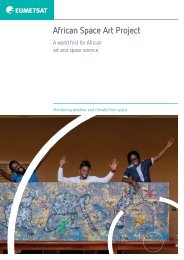EUMETSAT and Africa
European meteorological satellites at the service of Africa
European meteorological satellites at the service of Africa
- No tags were found...
Create successful ePaper yourself
Turn your PDF publications into a flip-book with our unique Google optimized e-Paper software.
Preparing <strong>Africa</strong> for the next generation<br />
of meteorological satellites<br />
Meteosat Third Generation (MTG) satellites will begin replacing the current secondgeneration<br />
satellites from 2022. The MTG system will provide continuity of the data <strong>and</strong><br />
information from MSG spacecraft but with more frequent, accurate <strong>and</strong> higher-quality<br />
observations of the weather <strong>and</strong> climate over the <strong>Africa</strong>n continent.<br />
MTG geostationary satellites located above the Gulf of Guinea<br />
will deliver imagery of the <strong>Africa</strong>n continent every 10 minutes,<br />
in 16 spectral b<strong>and</strong>s, at a resolution of 1km, plus a continuous<br />
lightning detection capability. This will provide unique<br />
information on fast developing high-impact weather, incoming<br />
solar energy, wild fires, sea surface temperature, turbidity of<br />
coastal waters, <strong>and</strong> more.<br />
The Lightning Imager (LI) on MTG spacecraft will be an<br />
important source of information for <strong>Africa</strong>n forecasters, given<br />
the relative lack of radar availability. It will be particularly<br />
important for aviation safety, <strong>and</strong> the protection of life<br />
<strong>and</strong> property.<br />
The MTG system will significantly improve monitoring of the<br />
weather <strong>and</strong> climate over <strong>Africa</strong> until the 2040s. The improved<br />
capabilities of the MTG system call for a strengthening of<br />
existing capacities in <strong>Africa</strong>, at regional <strong>and</strong> national levels, to<br />
access, process <strong>and</strong> make best use of the data.<br />
This wealth of information will allow for substantial<br />
improvements in safety <strong>and</strong> health-critical early warnings <strong>and</strong><br />
disaster risk reduction in <strong>Africa</strong>, as well as public <strong>and</strong> private<br />
decision making in vital weather-sensitive sectors of the<br />
economy, such as air traffic management, renewable energy<br />
<strong>and</strong> sustainable use of water, marine <strong>and</strong> agricultural resources.<br />
In planning for future initiatives in <strong>Africa</strong>, <strong>EUMETSAT</strong> will consider<br />
the impact of large volumes of data generated by new <strong>EUMETSAT</strong><br />
missions <strong>and</strong> those of the EU’s Copernicus programme.<br />
Since 2016, <strong>EUMETSAT</strong> has been regularly discussing with<br />
users of its data the opportunities <strong>and</strong> challenges arising<br />
from the transition from the current MSG system to the MTG<br />
system, in close cooperation with the WMO RA-I Data Expert<br />
Group (RAIDEG). <strong>EUMETSAT</strong> has developed a roadmap for the<br />
transition, taking into account <strong>Africa</strong>n priorities.<br />
In addition, more <strong>and</strong> higher quality data will become available<br />
from <strong>EUMETSAT</strong>’s second generation of the polar-orbiting<br />
Metop satellites, which will begin to be deployed from 2023,<br />
<strong>and</strong> from the Sentinel missions of the EU’s Copernicus Earth<br />
observation programme.<br />
08


